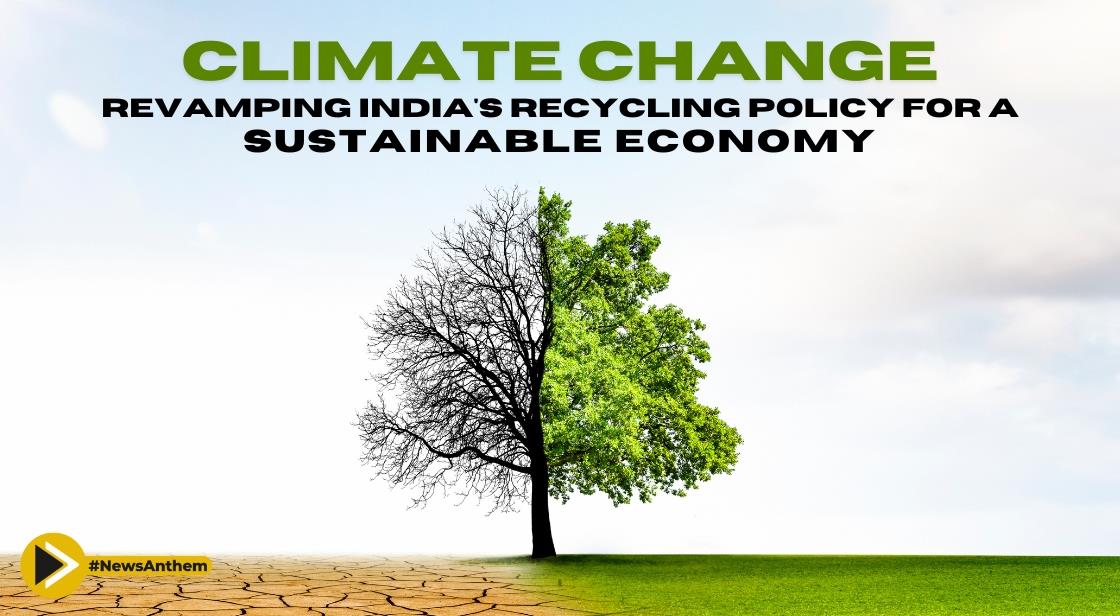Climate Change | Revamping India's Recycling Policy for a Sustainable Economy

News Synopsis
The Urgent Need for Revamping India's Recycling Policy
India is grappling with a mounting waste management challenge, with the generation of hazardous waste projected to increase in the coming years. The current recycling policy, although well-intentioned, falls short in effectively addressing the rising volumes of waste and the complexities posed by non-biodegradable materials. A revamp of the recycling policy is imperative to ensure a sustainable waste management system that aligns with the demands of the new economy,ustainable waste management system,
Rising Hazardous Waste Generation and the Impact on Landfills
The sheer volume of hazardous waste generated by industries in India poses a significant environmental and health risk. With approximately 41,523 industries producing around 7.9 million tonnes of hazardous waste annually, the need for improved waste management practices becomes evident. Out of this waste, nearly half is recyclable, making it essential to enhance recycling capabilities and reduce the burden on landfills.
Non-Biodegradable Waste: A Growing Concern
Non-biodegradable waste, including certain types of plastics, synthetic fibers, lithium-ion batteries, and solar waste, presents a pressing challenge. These materials contribute to the overflowing landfills, posing long-term environmental risks. However, recognizing the potential for waste recovery rather than mere decomposition can significantly mitigate these concerns. By focusing on recycling and extracting valuable metals from materials like solar panels and electronic waste, the environmental impact can be minimized, and valuable resources conserved.
The Growing Importance of Recycling Lithium-ion Batteries and Solar Waste
With the rapid growth of electric mobility in India, the disposal of lithium-ion batteries from electric vehicles emerges as a critical concern. As the number of end-of-life batteries increases, proper management and recycling become paramount. Recycling not only mitigates environmental risks but also reduces the need for extensive mining and preserves natural resources. Similarly, the impending rise in solar waste, estimated at approximately 1.8 million tonnes by 2050, necessitates effective recycling and reuse strategies to prevent ecosystem burden and protect human health.
Key Focus Areas for a Revamped Recycling Policy
To address the shortcomings of the existing recycling policy, three core areas require attention:
-
Incorporating Best Practices: Upgrading the recycling policy to include the latest advancements in recycling technologies and techniques is crucial. Emulating successful models, such as the European Green Deal's circular economy concept and the Waste Framework Directive, can guide the development of an effective and resource-efficient waste management framework.
-
Establishing a Strong Regulatory and Monitoring Body: Mere existence of laws is insufficient without robust enforcement mechanisms. A dedicated regulatory or monitoring body should oversee the implementation of recycling policies, ensuring compliance, conducting inspections, and imposing penalties for non-compliance. Drawing inspiration from the Environmental Protection Agency (EPA) in the United States, India can establish a similar entity to drive effective waste management practices.
-
Incentives for Recycling: Incentives for Recycling: Encouraging recycling practices requires the creation of incentives for individuals, businesses, and organizations. Examples from countries like Norway, where consumers are refunded fees upon recycling plastic bottles, demonstrate the effectiveness of such initiatives. Implementing tax incentives, grants, or carbon credits for recycling can be instrumental in driving behavioral change and promoting a circular economy.
Leveraging Tax Incentives and Grants to Drive Recycling
Tax incentives play a significant role in incentivizing recycling practices. By offering tax benefits to individuals and businesses engaged in recycling activities, the government can encourage participation and investment in recycling infrastructure. These incentives can range from tax deductions for investments in recycling facilities or equipment to reduced tax rates for businesses that meet specific recycling targets.
Furthermore, grants and subsidies can be provided to support research and development efforts in recycling technologies and promote innovation in waste management practices. These financial incentives help organizations overcome initial barriers and foster the adoption of advanced recycling methods.
Carbon Credits for Sustainable Waste Management
Integrating carbon credits into the recycling framework can provide an additional impetus for sustainable waste management. By quantifying and monetizing the carbon emissions reduced through recycling initiatives, businesses and organizations can earn carbon credits, which can be traded or used to offset their own emissions. This approach not only promotes recycling but also aligns waste management practices with climate change mitigation goals.
Advantages of a Revamped Recycling Policy
A comprehensive and revamped recycling policy in India can yield numerous benefits for the environment, economy, and society.
Environmental Benefits
By focusing on recycling and waste recovery, India can significantly reduce the volume of waste sent to landfills, minimizing the environmental impact and mitigating pollution risks. Proper disposal and recycling of non-biodegradable materials, such as plastics, lithium-ion batteries, and solar waste, help safeguard ecosystems and protect human health from harmful substances.
Resource Conservation and Economic Advantages
Recycling offers a sustainable approach to resource conservation. By extracting valuable metals and materials from waste, the need for extensive mining and resource extraction can be reduced, preserving natural resources and mitigating the environmental footprint associated with raw material production.
Additionally, recycling can stimulate the growth of a circular economy, creating new opportunities for job creation, innovation, and economic growth. The development of a robust recycling industry can generate employment across the value chain, from collection and sorting to processing and manufacturing.
Seizing the Opportunity for a Sustainable Future
India stands at a critical juncture in waste management, with the pressing need to revamp the recycling policy. Policymakers, organizations, and individuals must collaborate to embrace sustainable waste management practices, capitalize on recycling opportunities, and preserve natural resources for future generations. By incorporating best practices, establishing a strong regulatory body, and offering incentives for recycling, India can pave the way towards a greener and more sustainable future.
You May Like









